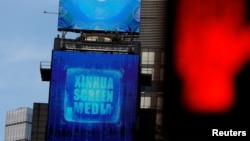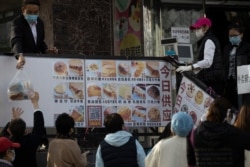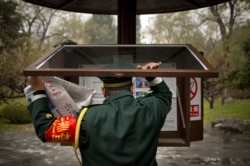China's state media are accusing the United States of spreading what they call a "political virus" by shifting the blame while bashing and smearing China amid the global fight against the coronavirus.
Without using names, the media accused the Trump administration of initiating a smear campaign against China and described the White House officials responsible as "ugly and unreasonable."
This is the latest in a series of intensifying attempts by Chinese media outlets and diplomats to shift the global narrative away from the country's mishandling of the COVID-19 outbreak in its early stages.
China's propaganda machine
That, observers say, shows that China's state-controlled news outlets have geared up to try to turn the coronavirus coverage to the government's advantage.
"The main target audience for China's propaganda efforts is primarily the domestic audience. Again, this is the bolster [of] the legitimacy of the Communist Party and, of course, the concentration of power on [President] Xi [Jinping] himself," said Oh Ei Sun, a senior fellow with the Singapore Institute of International Affairs.
Oh said China has long been skillful in turning any negative narrative to its advantage.
U.S.-China blame game
The blame began when the U.S. accused China of an initial cover-up which slowed the global response to the outbreak. China struck back by promoting a conspiracy theory that argued the virus originated in the United States and criticizing Washington for its slow response to the pandemic.
The number of confirmed COVID-19 patients outside of China has risen to more than 340,000, while the number in China has stabilized at around 81,000 patients.
Over the weekend, major Chinese state media including Xinhua News and People's Daily ran new editorials or commentaries that attacked the U.S. government.
In an editorial, People's Daily said the U.S. government is setting a bad example by launching a smear campaign against China.
"Smearing and stigmatization cannot deny the progress China has made in containing the virus' spread, nor will it help epidemic prevention and control in the United States. It only makes the White House politicians who initiated the smearing campaign against China look ugly and unreasonable," it read.
U.S. slow response
The newspaper said China has, since early January, regularly notified the U.S. of epidemic developments and prevention measures. "However, the U.S. side squandered the precious time China had bought for the global anti-virus fight," it added.
The newspaper also ran a story that details a petition, launched on the White House website this month, to demand that the U.S. government disclose the reasons for the closure in August 2019 of Fort Detrick, a U.S. Army biological laboratory in Fredrick, Maryland.
The petition, which hints without any evidence at a connection between the laboratory and the virus, has garnered fewer than 1,000 signatures, far from the 100,000-signature threshold required to compel an official response from the White House.
Meanwhile, People's Daily carried a front-page story on Monday featuring a diplomatic effort by Xi to promote a global health effort bringing mankind together to fight the pandemic.
Xi diplomacy
"China's experiences on epidemic control and its aid to the contagion-affected countries are boosting the confidence of the international community," the story said.
Arthur Ding, an adjunct research fellow at National Chengchi University's Institute of International Relations in Taipei, said Xi's administration feels compelled to take a more strident tone in dealing with the U.S. criticism because his governance model has been called into question.
Many "have questioned if the bureaucratic Communist system has failed. Simply put, [they suggest] the so-called Chinese model may be on the brink of collapsing. Therefore, Xi Jinping has to turn aggressive in redeeming it," Ding said.
By doing so, Xi will also be able to justify his near totalitarian style of rule at home in the past few years, the expert added.
Abroad, Xi is turning on the charm by offering medical resources to the contagion-affected countries including Italy and Spain, and portraying China as responding to the outbreak in a globally responsible manner, according to Ding.
Hold China accountable
"The Chinese model isn't necessarily appealing to Western countries. But China's efforts may bring these Western countries closer to it and thus further away from the U.S. I think these are the possible consequences," Ding said. He urged the U.S. to monitor China's growing geopolitical influence as it combats the disease.
In spite of China's stepped-up efforts to shift the narrative, rights activists Yang Jianli and Aaron Rhodes wrote in an article that the world must not lose track of the truth.
"The viral outbreak is China's responsibility, and China's willfully botched response in its early phases led to a pandemic, with huge loss of life that only now is beginning — in China and around the world," they wrote. They urged the world to hold China accountable.







